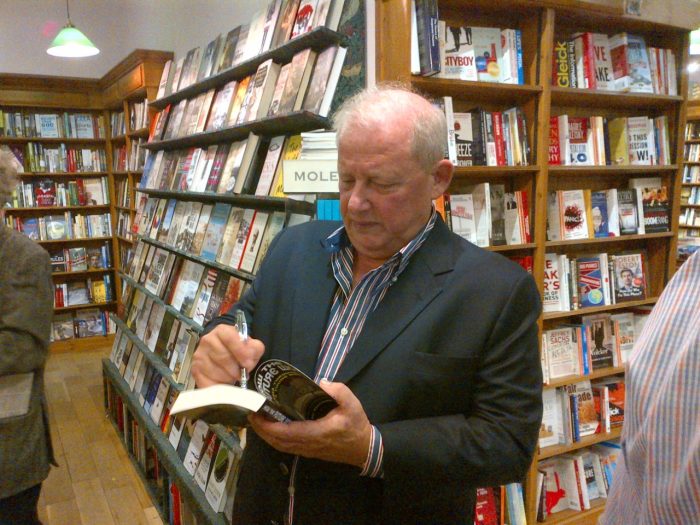
‘It is the only political force that can stop or, more realistically, slow down the juggernaut of modernity’, states our columnist, Alexander Boot, But he means ‘small c’ political conservatism, not Westminster political party Conservatism. Alexander is a columnist and public speaker, and a regular visitor to Jersey where he has family connections. See biographical notes at the foot of his article
The other day I came across a 1992 article A Strategy for the Right by the late Murray Rothbard, the guiding light of American libertarianism. The article is a curate’s egg, good in parts.
The good part is Rothbard’s economics, based as it is on the ideas of the Austrian School, mainly Ludwig von Mises. These feature a nostril-pinching disgust for big government, with its tyrannical tendency to play an active role in the economy.
The Austrians and Rothbard would happily sign their names to Burke’s maxim: ‘The moment that government appears at market, all the principles of market will be subverted.’ So they will be, and empirical proof is all around us.
Mises and Rothbard were also contemptuous of ‘scientific economists’, with their models, graphs and econometrics. To Mises, economics isn’t an experimental science like physics, but rather an a priori system of thought based on his understanding of human nature and how it manifests itself in economic behaviour.
Those Austrian ideas are close to my heart; some others aren’t. Such as their giving the economy a starring role in the drama of life. ‘Take care of free markets and everything else will take care of itself,’ is an anti-socialist notion I find almost as destructive as socialism.
Anti-socialism is largely socialism with the minus sign. Though reaching different conclusions, they both proceed from the primacy of economics. Hence, starting from different ends, they both arrive at materialist utilitarianism.
Mises’s deductive method is sound, while Marx’s induction is lame, especially since it proceeds from falsified facts. Yet I’d describe them both as totalitarian economists – economics is the hub around which their world revolves.
This is where both Mises and Rothbard diverge from conservatives, with whom they converge on the repudiation of the big state. Conservatives accept the primacy of free markets in the economy – but they reject the primacy of the economy in society. Economics, like any other system of thought, must proceed from the philosophical foundations on which our civilisation was built. If it doesn’t, it’ll fail even on its own terms.
Starting from economics alone, it’s impossible to arrive at conservatism. Conversely, a proper understanding of our religious and intellectual roots easily leads to economic and political rectitude. For example, devolving power to the lowest sensible level, and therefore rejecting the omnipotent central state, naturally flows from the church idea of subsidiarity – while the notion of preserving some safety nets is rooted in the church notion of solidarity.
Looking at his contemporaneous America, Rothbard was justifiably eager to change the status quo. Yet contrary to what Rothbard thought, conservatism doesn’t preclude change. The aspiration to preserve our civilisation presupposes making adjustments, sometimes radical ones, along the way. A conservative will exercise prudence in advocating change, but he won’t forswear it.
To quote Burke again: ‘A state without the means of some change, is without the means of its own conservation.’ Replace ‘state’ with ‘civilisation’, and that aphorism debunks Rothbard’s facile view.
One can sympathise with him, for, when it comes to understanding political conservatism, Rothbard suffers from the handicap of being a patriot of a state constituted on Enlightenment, and therefore anti-conservative, principles.
If the classic triad of God, king and country adequately defines British conservatism, it’s hard for an American to pass the litmus test of political conservatism encapsulated in the question: ‘So what is it about our political system that we wish to conserve?’
The French have the same problem and for the same reason: both countries, America more or less from birth and France in its present form, came to life as revolutionary republics denying the very essence of conservatism. Hence both are at odds with the real desideratum of conservative politics: preserving the traditional order of Christendom, adjusted to our time.
An American thinker would probably answer the lapidary question above by the shibboleth ‘the Constitution of the United States’. But, commendable though that document is in many respects, conservative it isn’t – even though it has had to act as the tight boot into which conservatively inclined Americans have had to shoehorn their political instincts.
That’s why, as Rothbard correctly remarks, the word ‘conservatism’ only became common currency in America after the 1953 publication of the book The Conservative Mind by the eminent Burkean, Russell Kirk. That was a noble attempt to find a conservative Anglo-American form to accommodate the amorphous American Right.
Alas, the term ‘Anglo-American conservatism’ is an oxymoron, for reasons I’ve outlined. Before long, the American Right splintered into libertarianism, anarcho-capitalism, Randian objectivism, fascisoid extremism – and neoconservatism, which relates to conservatism the way Neolithic relates to lithium.
Characteristically, Rothbard was a great admirer of Ayn Rand and her awful novel Atlas Shrugged, which he regarded as the greatest book of all time. Rand was the archangel of crude materialism, a nexus at which all strands of modernity, including libertarianism, converged.
Rothbard wasn’t repelled by Rand’s strident tone or the way in which she fused the values of cutthroat capitalism with fascistic aesthetics. At the centre of her Utopia stood the economically virile superman, towering over a godless world made in his image.
This was couched in the literary equivalent of Nazi and Soviet art depicting, respectively, a muscle-bound chap raising high the swastika or a muscle-bound chap raising high the hammer and sickle. Replace those attributes with a wrench and a balance sheet, keeping every other detail intact, and Rand’s clumsily painted picture will be complete.
It’s fashionable these days, among, for example, Trump’s admirers, to ignore the significance of tone and style. Yet these are essential to understanding conservatism. Though conservatism may be a philosophy, it’s not an ideology. The difference is critical: philosophy seeks truth; an ideology ignores truth if it gets in the way.
Yet one certainly doesn’t become a conservative by donning a ready-to-wear philosophical garment. People are drawn to political philosophies that suit their personality, temperament and general outlook on life. If the style was the man to Buffon, the style is definitely the conservative man.
A conservative may or may not wear three-piece pinstripes, but he certainly won’t wear camouflage trousers. He may or may not patronise classical recitals and picture galleries, but he certainly won’t patronise rap concerts and tattoo parlours. If he has a well-defined philosophy, he won’t express it in a shrill and strident tone.
That’s why, though I detest socialism, I’d prefer the company of a civilised socialist to that of a chap who wants to have all socialists hanged. This isn’t just an aesthetic consideration. I simply fear that, having hanged all socialists, the same chap may then hang me.
That’s why I don’t share the view of pas d’ennemis à droite, echoing the French revolutionary slogan of pas d’ennemis à gauche. But Rothbard clearly sees nothing wrong with extremist American groups, provided they aren’t anti-Semitic.
If true political conservatism is difficult in the US, it does exist in Britain. It may be moribund, but at least British conservatives can draw interest on the political capital built in the past.
Conservatism is the only political force that can stop or, more realistically, slow down the juggernaut of modernity. All other movements of the Right have too much in common with modernity to confront it effectively.
That’s why a brilliant man like Rothbard is as confused as a silly brute like Paul Golding of Britain First. Both cast the political Right adrift by cutting the ropes tying it to the philosophical and therefore political tradition of Christendom. With that ship consequently lost at sea, no individual brilliance, much less stridency, can navigate a route to a safe haven.
Biographical note:
Alexander Boot (born 1948) is a Russian-born writer of books and articles, previously a university lecturer and an advertising and public relations executive. His work promotes traditionalist conservatism and European culture. See further: https://en.wikipedia.org/wiki/Alexander_Boot




